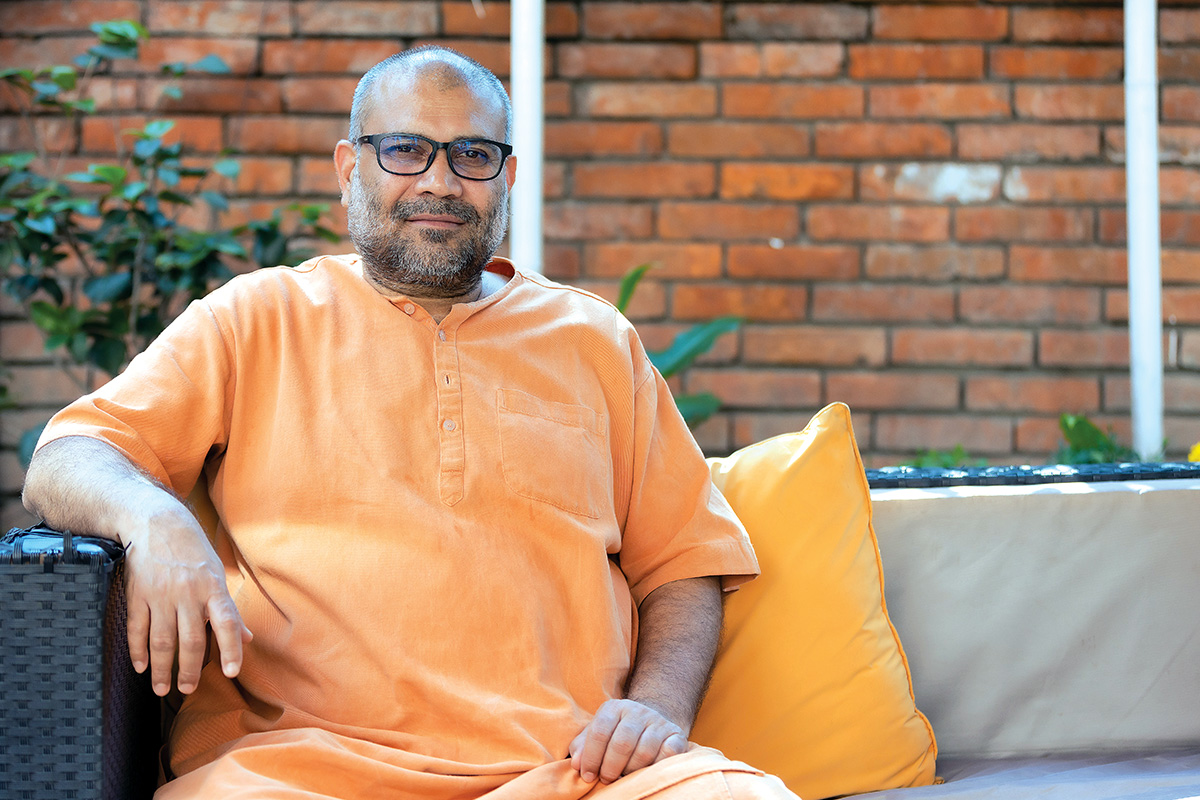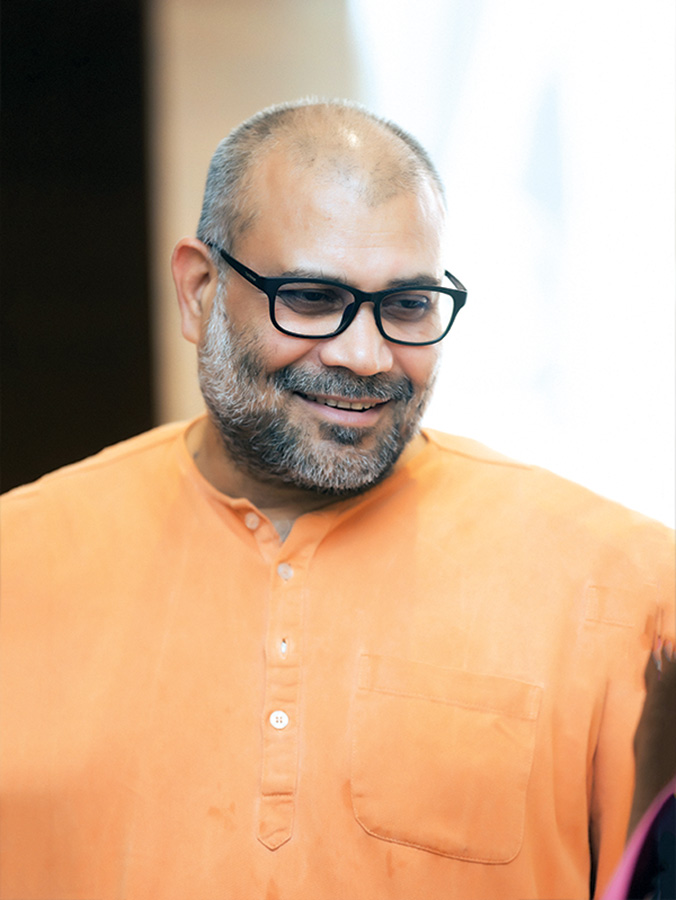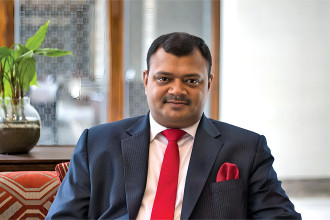
“The Hindu renaissance is about reclaiming civilisational pride with economic confidence. Nepal must see itself not just as a heritage site but as a living, thriving civilisational force. That will only happen when Nepal combines its spiritual capital with economic growth. Otherwise, temples will become tourist sites and nothing more”
Swami Vigyananand is an IIT alumnus, a Sanskrit scholar, a spiritual thinker and the global convenor of Hindu entrepreneurship and thought. As the Joint General Secretary of Vishva Hindu Parishad and Founder andChairman of World Hindu Foundation, he is a prominent voice in articulating the role of Hindu values in modern life. His work bridges tradition and contemporary challenges, and his initiatives - from the World Hindu Congress to the World Hindu Economic Forum - aim to empower Hindu society economically and spiritually.
His recently launched book, The Hindu Manifesto, presents a fresh articulation of eight civilisational sutras rooted in ancient Indian texts like the Vedas, Ramayana, Mahabharata, Arthashastra and Shukranitisar. These ideas, though ancient, are framed with a sharp relevance for the modern world, especially for countries like Nepal, which are rich in spiritual heritage but seeking faster economic growth. For Swami Vigyananand, dharma is not just a personal practice; it is a framework for national regeneration.
In a conversation with Business 360, Swami Vigyananand discusses how Hindu values can contribute to economic growth. Excerpts:
Nepal being a Hindu-majority nation, how do you view Nepal’s role in the global Hindu renaissance you often speak of?
Nepal holds a unique place in the Hindu world. Its spiritual heritage is unparalleled. It is the land of Pashupatinath, Muktinath and the Himalayas, which have been sanctified by sages and yogis for millennia. But a renaissance cannot happen through symbolism alone. It needs vitality, vision and economic strength. The Hindu renaissance is about reclaiming civilisational pride with economic confidence. Nepal must see itself not just as a heritage site but as a living, thriving civilisational force. That will only happen when Nepal combines its spiritual capital with economic growth. Otherwise, temples will become tourist sites and nothing more.
How can Nepal leverage its civilisational identity to foster not just cultural pride but also sustainable economic growth?
You must understand that culture without economy becomes nostalgia. And economy without culture becomes rootless. Nepal can strike the balance. What is needed is serious investment in branding and infrastructure. People come to Pashupatinath but they do not stay. Why? Because we have not created a full experience. Sacred zones should be created like in Sri Lanka where religious heritage is preserved with dignity but tourism is structured smartly around it. If pilgrims fly in the morning and leave by evening, what is the benefit to the local economy? We must ensure that cultural tourism becomes a sustainable economic engine. That means zoning laws, hospitality training, pilgrim circuits and above all, narrative-building. The Himalayas are not just mountains; they are the abode of Shiva. That needs to be sold as a lived spiritual experience.

Do you see a more prominent role for Nepal in platforms like the World Hindu Congress or World Hindu Economic Forum? How can Nepali businesses and thinkers engage more meaningfully?
In fact, we are planning to host a major World Hindu Economic Forum event in Nepal in 2027. Nepal is a natural choice. It has the dharmic capital, the people and the geographical location. But to participate meaningfully, Nepal needs to build its economic narrative. What products from Nepal can enter global markets? What are the unique offerings? For instance, you have tea from the Himalayas. Why hasn’t it been branded like Darjeeling or Ceylon tea? You have herbs, handicrafts, spiritual retreats, yet global branding is missing. The World Hindu Economic Forum can help but the local leadership must take initiative. Create a platform, invite Hindu entrepreneurs globally, and they will come.
In a time when business is often driven by profit, how can Hindu values such as dharma and seva be integrated into modern management and leadership practices?
Profit is not wrong. Let us be clear. Even Kautilya emphasised wealth creation. But Hindu thought never said profit is the ultimate aim. The Hindu way is: ‘Sahasrahasta Samahar, Sahasrahasta Sankir’ – earn with a hundred hands, give with a thousand. Profit must be earned ethically, shared generously and reinvested in society. Management, according to Hindu values, is about trusteeship. The business leader is a custodian, not just an owner. He is responsible for his workers, community, environment and future generations. That’s why I say that Hindu management does not reject modernity, it elevates it.
You have spoken often about creating a ‘Dharmic economic model’. What would that look like in a country like Nepal, which is still developing its industrial and entrepreneurial base?
A Dharmic economic model in Nepal would focus on self-reliance, community welfare and sustainability. It would not blindly imitate Western capitalism but would draw from its own roots. For example, industries near pilgrimage sites must be clean and non-disruptive. We must also develop micro-enterprises that retain wealth locally. Create banks that serve small traders, not just the elite. In India, we proposed micro-banks and SME banks and one of those models was partially adopted as Mudra Yojana. Nepal can do something similar. A Dharmic economy also respects nature, Mother Earth is not to be exploited but revered. So, the idea is ‘prosperity with responsibility’.
How do you think Nepal’s young entrepreneurs can be inspired by ancient Hindu philosophical ideas while still operating in a competitive global market?
The youth of Nepal are very talented, hardworking and aware. What they need is exposure to their own civilisational wisdom. Hindu philosophy teaches resilience, creativity and inner clarity, qualities any entrepreneur needs. For instance, the Bhagavad Gita teaches detached action: focus on the work, not the result. In business, that builds stamina. Also, Hindu tradition celebrates enterprise, just think of Vaisya dharma. But we need to update our storytelling. Hindu ideas should not feel like museum artifacts. They must be lived, demonstrated and taught in modern formats through mentorship, courses and platforms that fuse tradition with innovation.
The World Hindu Economic Forum encourages collaboration among Hindu entrepreneurs globally. What specific opportunities do you see for Nepali business leaders within this network?
I see immense opportunities. We have Hindu business leaders from Auckland to Alaska, from Oslo to Johannesburg. They are successful and rooted in values. A Nepali entrepreneur who makes a good product, be it a herbal cosmetic, a spiritual retreat package or an educational service, can find market access through our network. The diaspora is willing to support but you need a professional pitch, a business plan and a commitment to quality. This network is not charity, it is collaboration. I always say that the first step is to have a clear product identity. After that, access to capital, mentorship and market becomes possible.

Can you share any examples where Hindu economic thinking has successfully influenced policy or industry in a way that Nepal could also consider?
Yes, in India, when the Modi government first came to power, we submitted an economic document proposing the creation of two banks – one for micro loans and another for SMEs. While two banks were not created, the Mudra Yojana came into being based on that idea. It gave millions of small entrepreneurs access to credit. That is Hindu economic thinking in action: bottom-up growth, not top-down subsidies. Nepal can do the same. Instead of waiting for FDI, empower your own people with micro-capital, train them, support their ecosystems. That is real development. Also, start thinking in terms of the religious economy, what temples generate, what tourism can fund, how it can be reinvested locally.
How can countries like Nepal build a stronger base of economic self-reliance while still being part of the global economy?
Self-reliance does not mean isolation. It means standing on your own feet first. Nepal needs to identify its unique sectors like tourism, herbal medicine, education and organic agriculture, and build global-quality offerings in those. Develop brands. Create vocational ecosystems. At the same time, form partnerships with the diaspora, with India, with whoever aligns with your civilisational goals. But the idea is do not remain dependent on aid or remittances. Let remittances be a stepping stone, not a crutch.
What qualities should a leader cultivate, according to Hindu philosophy, to lead both ethically and effectively in today’s business world?
In Hindu thought, a true leader is a Sardar, someone who can give their head for the people. Leadership is not about personal gain. It is about responsibility, vision and compassion. A Hindu leader is expected to be tyagi (sacrificing), sevak (serving), and neta (guiding). And also, satvik (virtuous) in conduct. That does not mean weak, it means grounded. The best leader does not just speak about dharma, he lives it. In business, that means creating value, not just extracting it.
With many Nepali youth going abroad for work or study, how can we inspire them to return and contribute to the nation, both spiritually and economically?
This is a very important question. You cannot stop people from going abroad, nor should you. Let them gain skills, exposure and confidence. But the question is: What are you doing to make Nepal attractive enough to return to? If the country offers stability, opportunity and respect, people will come back.
Nepal is a heaven; it has the Himalayas, clean air, and spiritual energy. But what is missing is infrastructure, opportunity and the mindset that says, “You can build your future here.” We must make Nepal the land of opportunity, just like America once was. That is how India retained its talent, by creating tech parks, startups and capital access. Nepal must do the same.
What does ‘Hindu unity’ mean in practice when it comes to regional cooperation between countries like Nepal and India, especially in trade, education and innovation?
Hindu unity is not about slogans. It is about creating a platform of shared goals. Think of it like a motichoor ladoo (Indian sweet), many small grains bound together with syrup. It is soft, sweet and whole. But now, we need to make that ladoo firm and functional. Nepal and India share not just borders but civilisation. Cooperation should mean mutual recognition, ease of movement, student exchange, joint spiritual tourism circuits and shared innovation platforms. We should pool talent, invest in each other’s success, and speak in one voice on global platforms. Hindu unity is a strategy for prosperity, not just sentiment.






